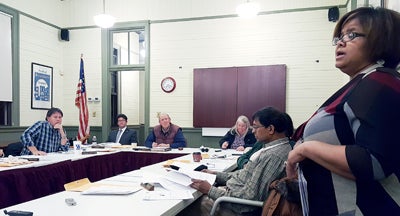Smoke-free or tobacco-free?: Stanford council debates city smoking ban
Published 9:57 am Friday, January 12, 2018

- Photo by Abigail Whitehouse Lincoln County Health Department Director Diane Miller, right, presents research on smoking and second-hand smoke Thursday night during the Stanford City Council meeting.
STANFORD — After hearing a presentation from the local health department, Stanford City Council members are debating the implementation of a smoking ban within city limits.
Lincoln County Health Department Director Diane Miller spoke to council members about the effects of smoking and second-hand smoke during the Jan. 4 city council meeting.
Miller distributed documentation with data from the Tobacco Free Kids advocacy group on the cost of smoking in Kentucky.
The data shows that smoking costs Kentucky $1.92 billion in annual health care expenditures and the 74 percent of Kentuckians who don’t smoke also foot the bill.
“Nationally, estimated smoking-related health costs and lost productivity total $19.16 per pack,” the document states.
The data also shows the toll on Kentuckians health with 4,830 new cases of lung cancer annually and 8,900 adult deaths each year from smoking.
There’s a difference between a smoke-free environment and a tobacco-free environment, Miller said.
“Smoke-free is just exactly what it says, where you don’t have smoking. But tobacco-free means there are no tobacco products at all,” she said. “That’s the type of policy we have at the health department. We started out with tobacco-free and just in August of 2014, we also (prohibited) electronic cigarettes.”
Eliminating harmful second-hand smoke from public places is a large part of the health department’s smoke-free campaign, she added. The local health department also offers smoking cessation classes.
Stanford Mayor Eddie Carter said Madison County has recently implemented a smoke-free policy.
Miller also included a copy of a 2007 Lincoln County ordinance that bans smoking inside county properties. However, according to the ordinance, smoking is permitted within “a reasonable distance” outside the Lincoln County Courthouse, the Arch “Buzz Walker” Building, the Lincoln County Judicial Center, the KU Annex, and the Planning and Zoning/Building Inspector’s Office, provided smoke does not enter through entrances, windows, ventilation systems or other means.
Steve Bullock, who hosts WPBK-FM’s morning General Store program, said there is usually a group of people smoking outside of the Property Valuation Administrator’s office on Main Street (the building also houses WPBK-FM).
“If I want to go talk to David Gambrel about my property taxes, I have to walk through that,” he said. “I raised tobacco for 30 years. It’s not that I’m against farming or raising tobacco, but I know what chemicals are on there. I shouldn’t have to take those into my body just so I can go see (Circuit Court Clerk) Teresa (Reed) or (PVA) David (Gambrel) or Eddie (Carter) or any other place.”
Bullock said there’s an empty parking lot 100 feet away but people don’t want to lose their place in line.
“One of the ladies that works at the PVA office is terribly asthmatic,” he said. “So she has to catch her breath in the street, walk through that, and then exhale and inhale when she gets inside of her workplace. To me, it’s the smoke. Whether you all do tobacco-free or not is up to you but I agree, E-cigarettes need to be there as well. It’s not right to those of us who choose not to for health reasons to have to walk through it to be able to license our vehicle.”
City Councilman Naren James said most people don’t realize how dangerous second-hand smoke is to individuals.
Councilman Ronnie Deatherage asked if all of Main Street would be included if the city were to ban smoking in public places.
Carter said the city could designate a specific distance from public buildings in their ordinance.
“If we want to, we can have it so many feet,” he said. “We might have to do that, if we do this.”
Most businesses and restaurants in the county have voluntarily become smoke-free environments, Miller said, aside from a few retail businesses.
“Some of your retail stores still allow smoking,” she said.
Councilman Scottie Ernst expressed concern with interfering with private businesses.
“Who owns the sidewalks?” Deatherage said. “The city owns the sidewalks.”
City Councilwoman Sara Givens suggested the city approach those retail businesses privately to see if they would be interested in becoming smoke or tobacco-free.
As far as enforcement, Carter said code enforcement and other city resources could help.
Carter suggested council members study other cities with policies in place and talk with constituents prior to next month’s meeting.
City Council members also agreed to invite the public to the next monthly meeting to express their opinions on the policies.
Miller said with new statistics coming out on e-cigarettes, the health department will be rolling out a new campaign next month to educate the youth in the community about the dangers of e-cigarettes.
SO YOU KNOW
The next Stanford City Council meeting will be at 6:30 p.m. on Feb. 1 at the L&N Depot. The public is invited to attend and voice their opinions on smoke-free or tobacco-free policies within city limits.





